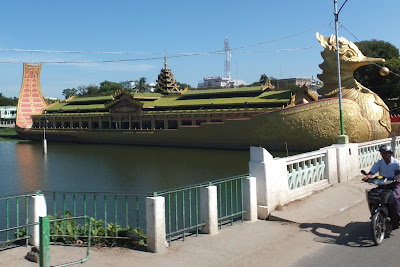Travel Date 23rd November 2012.
Click on any picture to see a larger version.
In planning this trip I tried to avoid internal air travel as much as I could. That was only partly caused by safety concerns over Myanmar's airlines (more on that later). My main reason was a wish to see the countryside rather than just pass over it.
Click on any picture to see a larger version.
In planning this trip I tried to avoid internal air travel as much as I could. That was only partly caused by safety concerns over Myanmar's airlines (more on that later). My main reason was a wish to see the countryside rather than just pass over it.
I do not usually like long bus rides. A
few hours is OK, but unless it is a first class sleeper bus like
the ones I used in Peru I don't enjoy overnight buses. In addition to
the lack of comfort, travelling overland by night tends to defeat the
purpose of seeing the passing view.
Trains are different; I enjoy most
trains, including the occasional night train, but reports from many
travellers of the slow, uncomfortable train from Yangon to Mandalay
and its often very late arrival caused me to take the flight for
that section. Similarly, air was the best option for my final leg
from Inle Lake (Heho Airport) to Yangon.
I deliberately
chose the boat to get from Mandalay to Nyaung U. After looking at the various options to
travel from Bagan to Inle lake, about 340km (210 miles) to the east,
I settled on bus, train and car: bus from Nyaung U to Thazi; train
from Thazi to Kalaw; and car from Kalaw to Nyaung Shwe, the town at
the north-east corner of Inle lake.
I bought my bus ticket the day before
for 10,000 kyats; that was the foreigner price in large letters at
the front of the ticket office. It seemed to be the same price to Inle lake, which is twice as far, and I suspect that the locals price was
considerably less but at AU$12 I couldn't complain. I was happy to walk down to the bus station for
the 8 am departure but the man in charge made it clear that I must be
picked up at the hotel, even though it is only a short walk from the
Aung Mingalar Hotel to the bus station. I wish I had stuck to my
guns; the few hundred yards in a cramped pickup next morning was the
most uncomfortable part of the trip.
We left on time. The bus was full,
reasonably modern, air-conditioned, but a bit dirty and not
well-cared for. Despite that and the TV constantly playing Burmese
pop the trip was comfortable and quicker than I expected. When I
asked what time we would arrive I thought the man said 3:30. Although
that seemed a bit late considering it was only 160 km, I accepted it as another slow Myanmar trip.
In fact, he meant 3 ½ hours for the journey, so I was pleasantly surprised to arrive before
lunch.
The scenery along the way was interesting without being
spectacular. One of the creatures in Burmese
mythology is the Hanthi, a combination of duck and swan. It appears
all over the place, but seems to have a special affinity for
restaurants; thus many are named “Golden Duck” or some other name
related to the Hanthi. Sometimes they take the symbology to extremes.
The bus stopped directly outside
Thazi's two guesthouses. The Wonderful, while not exactly living up
to its name, was more expensive at $20 but much nicer than the
Moonlight. I called this the Green Room.
Thazi is a small town at the junction of a branch line to the east off the Yangon–Mandalay rail line about 150 km south of
Mandalay. After reading reports of the very slow but scenic section from Thazi to Kalaw I decided to take it. The trip is only about 100km but takes six hours by rail as it winds its steep way climbing over 1500m (5000ft) from Thazi, including two double switch-backs, before dropping back to Kalaw at 1230m.
The town is effectively a long main street with a few short side streets, including the one to the railway station.
At the station I discovered that I could not buy my ticket in advance. The train would leave at 6am. I was told to be there at 5 am or I may not get a seat in "Upper Class". It was also made clear that as a foreigner I may not be allowed to buy in "Ordinary Class".
While eating lunch I tried to discreetly take a picture of the two soldiers in the restaurant opposite the station, but eventually gave up as this man seemed much too interested in what I was doing.
I wanted to buy some band aids for my medical kit. This place had a red cross out the front but it turned out to be the local dentist. I got the impression that the patient would have liked a much stronger dose of anaesthetic.
I wanted to buy some band aids for my medical kit. This place had a red cross out the front but it turned out to be the local dentist. I got the impression that the patient would have liked a much stronger dose of anaesthetic.
Until sundown the main street was usually deserted, with an occasional pickup or horse cart trundling along. But at dusk, about 5:30, pickups and people seemed to appear from everywhere. Suddenly cafes and restaurants were lit up, a bar opened, and the pickups started loading to take people home. Full up? Never; there is always room on top.
I had an excellent breakfast at the Wonderful Guest House at 4:30 am. My host was a lovely lady who could not do enough for me. She provided a wake-up call and prepared breakfast including my special request for fried eggs. I recommend it as good accommodation in Thazi. She also arranged for a horse cart to take me to the station where I went through a fascinating bureaucratic rigmarole to get my Upper Class $5 ticket.
A couple of other trains came and went.
Most of the waiting passengers appeared to have spent the night on the platform.
Nobody mentioned that I was waiting at the wrong platform; eventually I realised that this train at the next platform was mine; I made it in time.
This was the Upper Class seat opposite mine. My seat was comfortable, provided I was happy to accept laying back at full recline because all of the various adjustments were broken. Most of the seats were back as far as they could go. They also all appeared to be overdue for their once-a-decade cleaning. If you look closely at the picture you will see a boot-print at the top right. That was left over from my successful attempt to kill a large spider that scuttled out of the armrest, where the broken tray-table used to be. The overall condition of the carriage could best be described as past its use-by date.
Dawn appeared over the distant hills just after we left the station.
This place was next to a large teak storage yard. I sincerely hope it isn't what it looks like: a labour camp.
As we reached the climb to the mountains we passed a lot of small villages close to the line. We tended to crawl along at not much more than walking pace as we climbed. Occasionally passengers would jump from the train, or run alongside and jump on board if there was no official stop.
At every stop along the way the platform would be crowded with villagers selling their wares; mainly food but sometimes craft goods.
This lady started with a large fish, presumably brought up on the train because we were a long way from the Irrawaddy by now. She gutted, chopped and sliced it to order for customers on the spot. We were stopped at the station for about ten minutes. She had a good day and sold parts of the fish to a dozen customers in that time until it was gone.
The scenery was spectacular at times. It was difficult to get pictures in several spots because the line often passed through heavy foliage; like green tunnels in the forest. When it cleared there were some beautiful spots.
We arrived in Kalaw at 12:30 after a thoroughly enjoyable morning despite the condition of the carriage. I took a book along but I didn't read a page because there was always something happening, either on board or in a station, or interesting scenery to watch.
Cheers, Alan


























In a way it looks a poor country. Oppressed, not much is known about this neighbour of ours. Though our country was in touch for centuries, someone stopped it for decades.:-(
ReplyDeleteReading about it though your pages is comforting. It appears poor , but it looks like, they are living greener lives.
Hello Alan,
ReplyDeleteYour post is really helpful to me as there is not so much information on internet regarding how to go from Bagan to Inle Lake.
I would like to know if you remember if there were other schedule for the bus departing from Bagan?
The one you took was at 8:00AM, I would prefer an evening bus.
Do you know where I can find this information?
Thank you in advance Alan!
Marcy
Excellent and accurate, Alan. I wish I had known about your article before we made the journey from Thazi to Kalaw.
ReplyDeleteNow I'm going to see what you may have written about travel from Ko Samet, Thailand to Kao Chang.
Cheers
David Anderson
Thanks David. I hope you enjoyed Myanmar. I'm afraid my only experience of Thailand so far is Bangkok. I never got out of the city. I have tended to use Bangkok as a transit to other places. I must change that :)
Delete